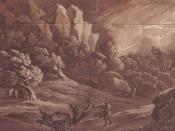In Macbeth, a play by William Shakespeare, the main character has a tragic flaw. Macbeth, the main character, has a single tragic flaw that consequently leads to his downfall in the end. Macbeth's downfall was caused by a series of events in the play. The events were brought upon by the choices made by Macbeth, but the downfall of Macbeth could have been avoided. Macbeth had three main catalysts in the choices he made which lead to his great death.
Lady Macbeth is a main cause of the destructive decisions that Macbeth makes. Lady Macbeth persuades Macbeth to kill King Duncan so that Macbeth will advance to king. Macbeth is unsure of the choice he is about to make, but Lady Macbeth is there to push him. She says, "Come, you spirits that tend on mortal thoughts, unsex me here, and fill me, from the crown to the toe, top-full of direst cruelty" (1.5.38-41)!
Lady Macbeth became so power-seeking that she wanted to be "unsexed" in order that she could kill Duncan herself for her husband. Lady Macbeth avoids killing Duncan because she says he looks too much like her father, which left only Macbeth to do the unrighteous deed. Macbeth was heavily persuaded by the pressure to become more from Lady Macbeth.
The witches were the second great catalyst to the downfall of Macbeth. The witches predicted that Macbeth will become the Thane of Cawdor and that he will become king. Macbeth is influenced by the witches and their predictions cause Macbeth to dig deeper into his greed of ambition. Banguo, Macbeth's predecessor, was present during the predictions and the witches predicted that Banquo's sons would become kings. They predicted, "Thou shalt get kings, though thou be none. So all hail, Macbeth and Banquo" (1.3.67, 68). Macbeth knew he...


